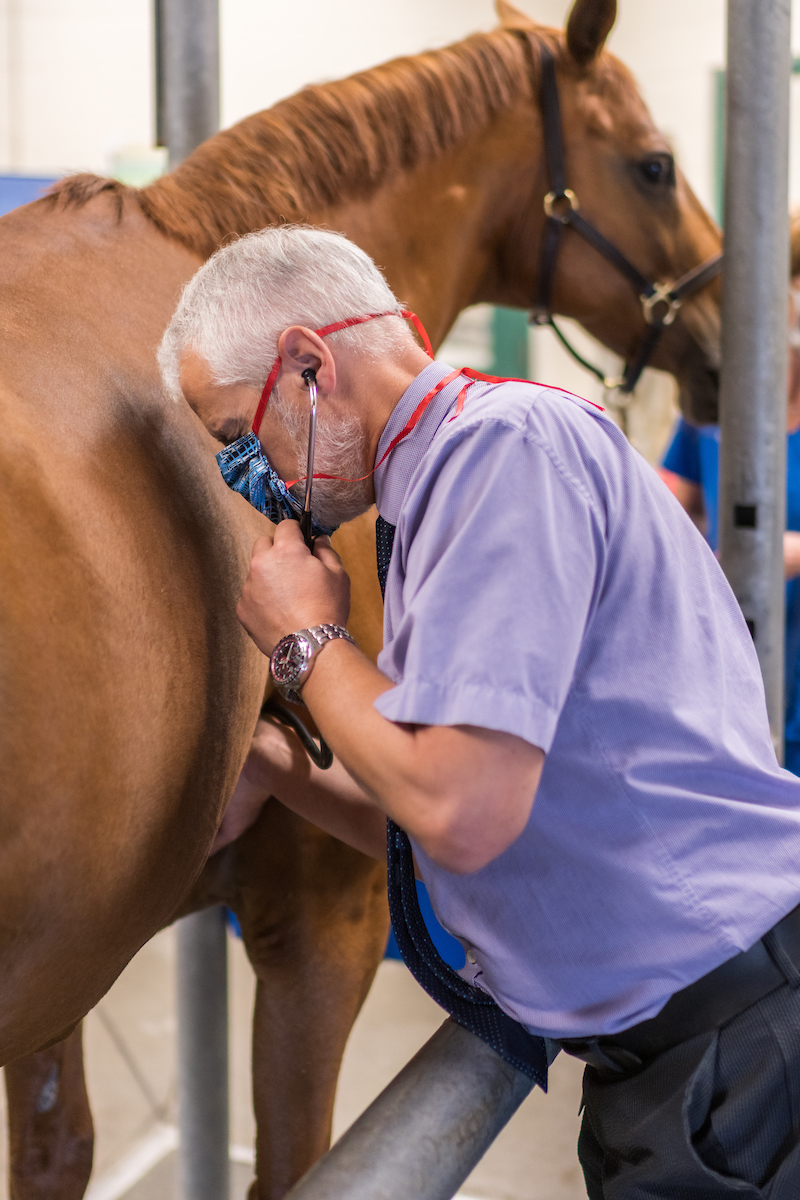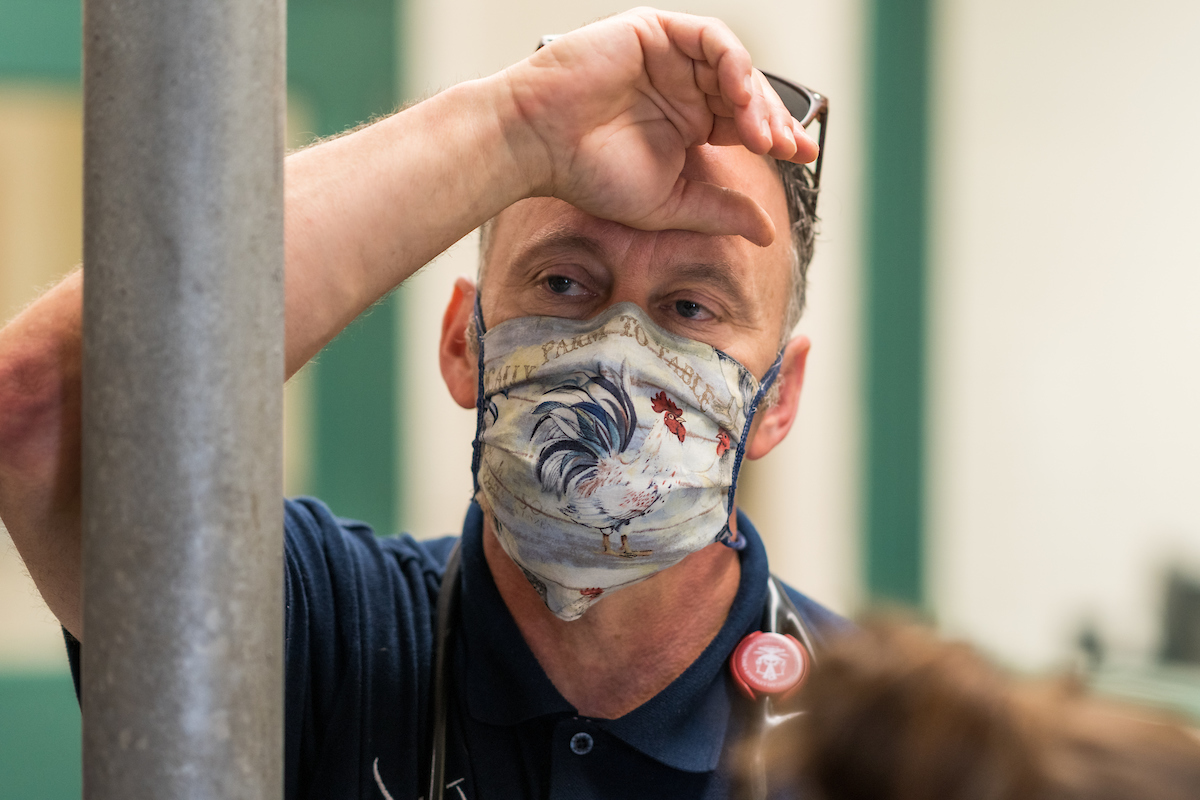Horse recovering well after successful treatment at UF for heart arrhythmia

Capone, a 15-year-old Oldenburg warmblood, with large animal veterinary technician Heather Wells, left, and cardiology technician Courtney Hanner in UF’s Large Animal Hospital on May 18. (Photo by Louis Brems)
By Sarah Carey
Mississippi resident Sarah Sheen-Kilic knew something was wrong that April morning when she went to ride her normally strong, ride-ready Oldenburg warmblood, Capone, as she does almost every day. He didn’t want to move.
It was hot, Sheen-Kilic told herself. So she gave Capone a few days to show improvement. When he didn’t, she called her veterinarian, Dr. Donnie Vice, who listened to Capone’s heart and recommended she take her horse to a specialist.
Sheen-Kilic initially took Capone to Mississippi State University, where he was diagnosed with atrial fibrillation, an irregular, often rapid heart rate associated with poor blood flow and the most common arrhythmia associated with exercise intolerance. However, the drug typically given as a first step to correct the problem was in short supply, and MSU did not provide the other treatment — known as transvenous electrical cardioversion, or TVEC . Vice contacted the University of Florida’s Large Animal Hospital, which offers an array of cardiology services, including TVEC.

Dr. Simon Swift and Dr. Todd Holbrook and their teams are shown with Capone during an echocardiogram being performed at UF’s Large Animal Hospital on May 18. (Photo by Louis Brems)
“I spoke to Dr. Todd Holbrook there, and he said he would do the procedure, but that it is normally the second step in the process,” Sheen-Kilic said. “He seemed to be concerned.”
With no small amount of trepidation, after months of quarantine at her home due to the COVID-19 pandemic, she and her husband, Phillip Grady, packed up their truck and trailer in mid-May and brought Capone to UF.
“It did make it a much more challenging trip for us with the COVID situation, because I had just stayed completely isolated at my house and at my stable, and all of a sudden I had to make the journey to Florida,” Sheen-Kilic said. “It was quite something to be traveling, stopping at gas stations and so on, but we knew we had to get him well.”
When Capone arrived, Holbrook, a professor of equine medicine at Oklahoma State University who is visiting UF for training, worked with UF’s veterinary cardiology service to arrange additional tests, including an echocardiogram. The tests were important to assess the relative risk associated with both forms of treatment of Capone’s condition.

Dr. Simon Swift and Dr. Todd Holbrook preform an echocardiogram on Capone, a 15-year old dressage horse from Mississippi. (Photo by Louis Brems)
“Typically, if you have a horse coming for cardiac conversion, you have a long discussion about the ins and outs of it,” said Dr. Simon Swift, chief of UF’s veterinary cardiology service, who performed the echocardiogram and was on standby to perform the TVEC if Sheen-Kilic decided to go with that procedure. “There are risks associated with both procedures.”
Although UF had the drug quinidine, the drug treatment of choice for atrial fibrillation in horses, in stock and was capable of providing the TVEC procedure as well, the horse’s overall condition and the owner’s comfort level were key.
“The risk of post-anesthetic myopathy is greater in heavily muscled horses for any anesthetic procedure,” Holbrook said. “With electrical shock, skeletal muscles are activated also. We do not know if this increases the risk of complications, but intuitively, it could.”
“Capone weighed somewhere north of 1,300 pounds,” Holbrook said. “He had been out of work, and was overweight. We saw clinical signs of muscle tremors, sweating and anxiety, and some forms of exercise-induced myopathy are more common in anxious horses. Considering the whole picture, I recommended that we try the medical treatment first, and go to the TVEC if that was not effective.”
By the end of the day on May 19, UF veterinarians knew their work had been a success.
“They gave him three doses, starting about 8 a.m., and then waiting two hours for another dose, with the last dose given midday,” Sheen-Kilic said. “After a couple of hours, Dr. Holbrook sent me a message that it was successful, along with a photo and a picture of his heart rhythm. I cried.”
Quinidine has been used for decades, Holbrook said.
“It usually works quite well in horses that do not have underlying cardiac disease that led to enlargement, such as acquired valvular disease. This horse had no evidence of murmurs or structural cardiac changes. But quinidine can be toxic, and the dose that causes conversion and toxicity are quite close.”
Prior to starting treatment, a telemetric ECG is placed to record the heart rhythm continuously, he added. Then the drug is administered once every two hours, with the risk of toxicity increasing with each dose.
“Capone converted shortly after the third dose, and we used ECG to confirm conversion to a normal rhythm,” he said.
Holbrook said he advised Sheen-Kilic to purchase a heart rate monitor to track Capone’s reintroduction to exercise.
Back in Mississippi for just over two months, Sheen-Kilic says Capone is his normal energetic self.
“He and I are learning dressage now, and hopefully in the future we will compete,” she said. “I suppose more than anything, he’s a loved part of the family.”



















